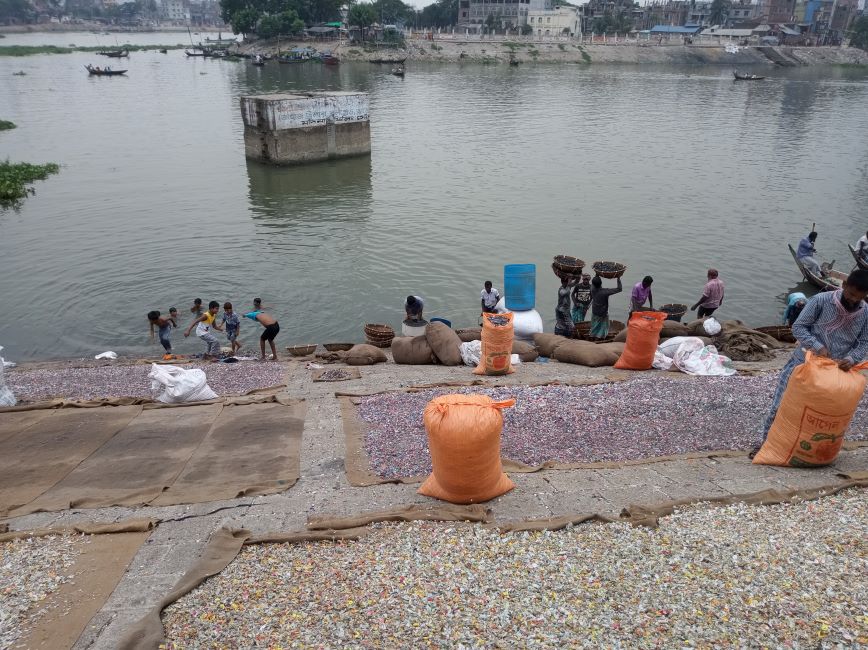Indiscriminate waste dumping continues in Buriganga

Dhaka, 20 June, 2020: A floating waste island is developing at Baganbari point of the river
From domestic to industrial, all kinds of waste are being dumped indiscriminately in the Buriganga River, polluting the river during the lockdown.
A whole body of citizens, including industrialists, traders and government agencies are contributing to the contamination of the water and destroying the river's ecosystem.
In Baganbari, which is two kilometers west from the second bridge on the Buriganga, tons of waste are floating. At the same time, a lot of waste has piled up, making it all seem like an island on the river.
 In this photo taken recently shows a dog sits on a pile of garbage on the bank of Buriganga river | Mehedi Al Amin/Dhaka TribuneAnyone seeing that will think it is a big dumping station which is becoming an island on the river.
In this photo taken recently shows a dog sits on a pile of garbage on the bank of Buriganga river | Mehedi Al Amin/Dhaka TribuneAnyone seeing that will think it is a big dumping station which is becoming an island on the river.
Abdur Rashid, a rickshaw garage owner, said: “The government had dredged those wastes from the bottom of the river and then left them on the river bank. This government initiative is good for nothing.”
Just opposite this area, waste collectors in Koilaghat of Kamrangirchar under ward no 57 of Dhaka South City Corporation (DSCC) were seen dumping waste on the river bank from eight waste collecting vans. Much of the waste was going directly into the river.
Rojob Ali, a waste collector, said: “Every day hundreds of vans come here full of waste. They dump waste on the river bank. Then a big waste collecting truck takes the waste to the dumping station in Matuail.”
From Babubazar to Kamrangirchar Lohar Bridge (Iron Bridge) area, the river bank was seen full of waste.
Not only this, on the opposite side of the river from the second bridge on the Buriganga to Tower Ghat area of Jinjira under Keraniganj upazila, there are many small unauthorized dumping points.
The distance between one dumping point from another is 50 yards to 200 yards maximum. All of the waste is contaminating the waters of the Buriganga.
 Workers unload raw materials from boats on the bank of Buriganga river | Mehedi Al Amin/Dhaka TribuneAshik Hossain, a small business owner in Tower Ghat area said: “ There are many small size industries and trading houses in this area. All of them dump their waste here.”
Workers unload raw materials from boats on the bank of Buriganga river | Mehedi Al Amin/Dhaka TribuneAshik Hossain, a small business owner in Tower Ghat area said: “ There are many small size industries and trading houses in this area. All of them dump their waste here.”
Sheikh Rokon, Secretary General of Riverine People, said: “During lockdown, the legal activities of the authorities were limited. In this situation, pollution and river encroachment increased worldwide as well as in Bangladesh.
“Making a mound of waste on the river and river bank is not only pollution but also the primary stage of encroachment. First the river is filled with the waste and then people encroach on the river gradually by building structures on those mounds. In most cases, lower ranking government officials are involved in this process in collaboration with the local musclemen and powerful people,” he said.
“The only way to save the river is to protect it from pollution and encroachment and also protect it from re-pollution and re-encroachment.” he added.
What are the authorities doing?
Abdulla Al Mamun, deputy director of the Department of Environment (DoE), said: “The DoE office has just resumed after the lifting of the lockdown. We will visit the place first and then we will take action based on the gravity of the offence. Bank of the Buriganga river is full of waste in this photo taken recently | Rajib Dhar/Dhaka Tribune
Bank of the Buriganga river is full of waste in this photo taken recently | Rajib Dhar/Dhaka Tribune
“If offenders can reduce the pollution or encroachment by themselves that would be fine. If they do not, then they will face hard punishment according to the Law,” he added.
Mohammad Mizanur Rahman Siddiqui, additional chief waste management officer of DSCC, said: “We will be looking into the matter as you have informed me now.
“We have no waste collectors at Ward no 55, 56, and 57 in Kamrangirchar. Waste in those three wards is managed by a contractor appointed by the city corporation. We will take necessary initiatives if there is any mismanagement,” he said.
Micro plastic mixing with the water
Many people wash shredded plastic in the river and dry it on the embankment of the river in Tanki Bazar Ghat area, around 300 yards west of Shwarighat.
In both cases, thousands of micro plastics are mixing with the waters of the river every day.
A man named Mizanur Rahman was seen collecting money from the owners of plastic businesses.
Mizanur said: “I am collecting money on behalf of the lease holder. Around 100 plastic businesses use this area to wash and dry up shredded plastic.”
However, Mizanur refused to name the owner of the embankment and who had taken the lease.
Sheikh Rokon said: “Western countries use more plastic than we do. Some European countries use 10 times more plastic than us but we pollute the environment 10 times more compared to them. This is because western countries reuse almost 100% plastic. They manage waste from home, both that which is recyclable and which is not.
“These micro plastics are going to the ocean and seriously harming marine life,” he added.
Read More
.
.

